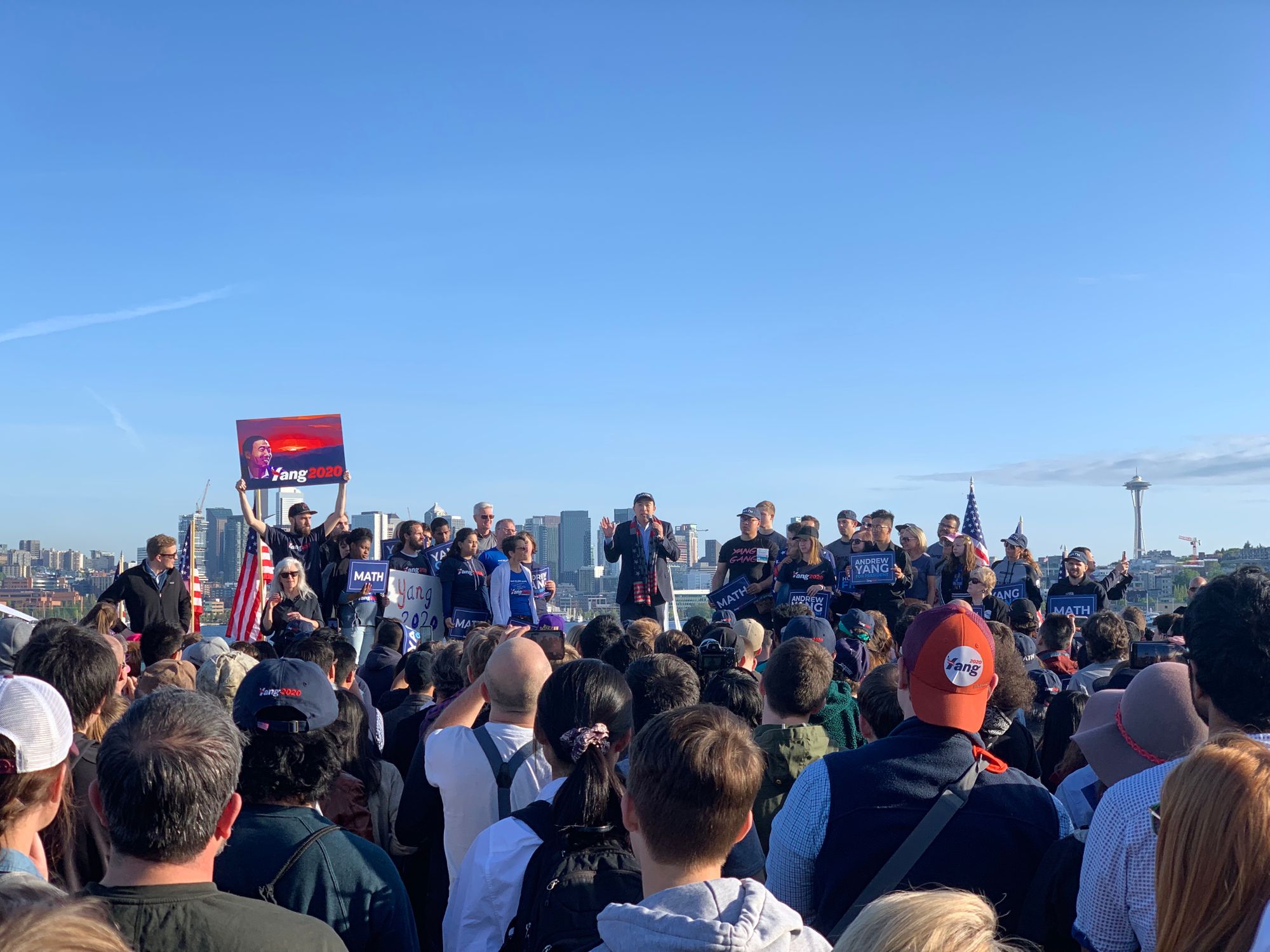Andrew and the Yang Gang

It's only early May and the 2020 presidential race already has a ton of people vying for the top spot. Just last week Michael Bennet announced his candidacy for president, the 22 person to do so. I haven't decided on my preferred candidate yet as we're still a year out and the first debate isn't until late June but I am leaning towards Sanders and Warren. However, there was a Andrew Yang rally last Friday and I wanted to see what his main positions were.
The rally was moderately sized and the people there seemed generally energized about Yang and his gang. People held signs saying "Andrew Yang" or "Humanity First" or "Math". When Yang got on stage he was wearing a hat that said "Math". On his site he has a character of himself, also wearing a "Math" hat.

It seems like Yang really likes "Math". According to him it stands for "Make America Think Harder". Or maybe it just stands for "Math". Anyway, Yang spoke about his three biggest policy points, which happen to be also listed on his main site.
Universal Basic Income
Universal basic income (UBI) is a pretty simple idea. Yang's idea for universal basic income, he also calls it "the Freedom Dividend", is that every adult over 18* gets $1,000 a month or $12,000 a year, no questions asked. You might have a few questions about this, Yang answers some on his site, like "How would we pay for UBI?" or "Is there evidence to support the case for UBI?" Also note the asterisk on every adult over 18, if you don't graduate high school your dividend doesn't start until you turn 20. Yang tries to answer the questions that most "fiscally conservative" people might wonder about. One of my major concerns is what happens to the current social programs we have in place currently. He answers this in the "How would we pay for UBI?" section.
We currently spend between $500 and $600 billion a year on welfare programs, food stamps, disability and the like. This reduces the cost of Universal Basic Income because people already receiving benefits would have a choice but would be ineligible to receive the full $1,000 in addition to current benefits.
People who already receive benefits would have a choice on if they want their existing benefits or $1,000 a month. During the rally Yang said that he likes doing math and I wonder if he's done the math on this point? Thankfully two economic researchers looked into this recently. They published a paper February 2019 titled "Universal Basic Income in the US and Advanced Countries" (if you have a Northeastern email address you can enter your email on the page and download it for free). Vox apparently has a Husky email account so they took a look at this paper and published an article about it. The abstract of the paper already points out flaws with the current UBI proposals.
A UBI would direct much larger shares of transfers to childless, non-elderly, non-disabled households than existing programs, and much more to middle-income rather than poor households. A UBI large enough to increase transfers to low-income families would be enormously expensive.
I'm not too concerned about paying for UBI, we can pay for wars and we can pay to put a person on the moon, we can pay for UBI. By taxing the rich. My biggest concern is that Yang's UBI proposal wouldn't truly help people who need it the most, even worse, it would hurt them by reducing benefits. Once again from the paper.
The kinds of UBIs often discussed would cost nearly double current total spending on the "big three" programs (Social Security, Medicare, and Medicaid). Moreover, each of these programs would likely be necessary even if a UBI were in place, as each addresses needs that would not be well served by a uniform cash transfer.
Does it make sense to give everyone a basic income? Probably. Does it make sense to do that while diminishing benefits to people who need it the most? No. I would rather expand and improve current social programs. Now I would hope that Yang doesn't intend to hurt people under current social programs but his current policy proposal doesn't currently address this issue.
Medicare for All
Medicare is government health insurance for people 65 and over. This shouldn't be confused with Medicaid which is government assistance for people who cannot afford health care. Yang supports a "Medicare-for-All public option". Be aware that there are two different types of Medicare-for-all, public option (Yang) and single payer (Sanders). Remember when the Affordable Care Act (ACA) was being worked through Congress? A public option was initially part of the bill, before Joe Lieberman killed it. Imagine, public option healthcare, in 2010. My issue with a public option is that it leaves health care insurance companies around, the people that deny sick people as much health care coverage as possible. Single payer is the next best step past a public option, the government covers all healthcare costs.
At the rally nor on his website does Yang mention how Medicare-for-all would be paid for. If we look back to how Yang says we will pay for UBI he mentions a Value-Added Tax (VAT). According to Wikipedia, a VAT is a type of tax that is assessed incrementally, based on the increase in value of a product or service at each stage of production or distribution. They also have a helpful picture.

At the end of the day, consumers pay more. My criticism with a VAT is that, like a sales tax, it affects poor people more than rich people. A rebuttal is that rich people consume more which means they pay more in taxes. This may be true but that doesn't take away from the fact that poor people would pay more of a percentage of their income in VAT taxes than rich people.
I guess my real question for Andrew Yang is why is he afraid of taxing the rich.
Human Centered Capitalism
This seems like a thing Yang made up but actually some guy wrote about it way back in 2012. Yang's version has three tenants.
- Humans are more important than money.
- The unit of a Human Capitalism economy is each person, not each dollar.
- Markets exist to serve our common goals and values.
This sounds similar to what a social democrat would believe in. Note that there is a difference between a social democrat (strong social programs voted for while in a capitalist economy) and a democratic socialist (socialism imposed through democracy, Sanders has described himself as a democratic socialist). One of my issues with "Human Centered Capitalism" is the "Capitalism" part. Capitalism doesn't care about people (social?) it cares about money (capital?). The main incentive for businesses is to make money, they don't really care if they poison our water supply, burn our crops, and deliver a plague upon our houses. Yang addresses this with this quote, from his site.
In order to spur development, the government should issue a new currency – the Digital Social Credit – which can be converted into dollars and used to reward people and organizations who drive significant social value. This new currency would allow people to measure the amount of good that they have done through various programs and actions.
I'm not going to go into how we measure social value or "good" but the concern here is that the money you make off doing "good" should outweigh the money you make off dramatically increasing the price of insulin or increasing the price of a life saving tablet from $13.50 to $750 in one day.
Final Thoughts
I'm fairly comfortable voting for any Democratic challenger to Trump in 2020. Yes, even Biden. But when I have a choice of which candidate I prefer the most, Yang isn't my preferred at the moment. Once debate season has started I'll hopefully be able to get a better sense of what candidate I support. However, Yang did say that he would use PowerPoint at the State of the Union. That's pretty cool or maybe that's pretty "Math"?
